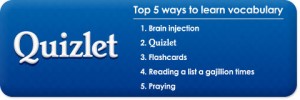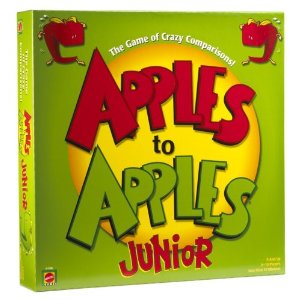business curriculum EFL eikaiwa ES kids language courses Language learning online resources school management self-study teaching vocabulary
by sendaiben
leave a comment
Quizlet may just be what I have been looking for all these years…
For years, I have been looking for a simple, cheap (free?) online tool to allow our younger students to work on their vocabulary outside of class.
Jim George, a friend and fellow school owner, has been going on about Quizlet for a while now, but I didn’t really pay attention until he sent me a detailed email this morning explaining the functionality.
It looks great.
Basically it’s a site that allows people to create and study simple flashcard quizzes online. Free accounts (students) can access content and premium accounts ($15 a year) can create quizzes with words and pictures.
The great thing about it is that as a school we can create study groups and upload content for the students to practice every week. Students can make accounts and join the groups and practice the content for their class. We can also monitor their progress by ‘friending’ them.
It sounds like it has everything we need. I’ll be trying it out over the next few weeks, then I’ll report back with my impressions.
Anyone else use Quizlet?
business conference curriculum EFL eikaiwa ES expectations extensive listening extensive reading kids language courses Language learning listening online resources presentations Reading school management self-study teaching technology theory university vocabulary
by sendaiben
8 comments
Amazing Minds 2011
I’m on the train on the way back to Sendai now, after a long, tiring, and wonderful weekend talking and learning about teaching. Pearson Kirihara was kind enough to invite me to their annual study meet, Amazing Minds, held in Tokyo this year.
The basic idea behind the event is that the publisher’s sales representatives nominate teachers all over Japan who are then contacted to see if they want to attend. Pearson picks up the tab for travel, accommodation, and food, and puts on a two-day program of presentations, discussions, and informal gatherings. Apparently it’s supposed to be a chance for the company to give back to the teaching community, to join and contribute to the dialogue on teaching in Japan, and to get to know individual teachers better.
I was initially skeptical, although having two of my friends (John Wiltshier and Ann Mayeda) presenting made it a lot easier for me to say yes and make the effort to clear my schedule.
The program for the event was three blocks: one on Saturday followed by dinner, then two on Sunday. Each block consisted of an initial one-hour lecture followed by a ninety-minute group activity session, and finally a feedback session to finish off. Each block was three and a half hours, a long time when you are out of practice concentrating. I got a good sense of what my university students go through most days (they have up to five ninety minute lectures per day).
The three lectures were:
“Two Pathways for Successful Language Learning”, John Wiltshier
“Teaching in 2020: Rethinking the Classroom Environment”, Ann Mayeda
“Lesson Analysis Checklist for Elementary School English Education”, Emiko Yukawa
I have to say I really enjoyed the presentations and came away with dozens of actionable ideas. Overall it was a great experience. I did notice a few things that could be tweaked to make it even better, but I have already passed those on to the organizers and don’t need to mention them here. Instead, I’d like to talk about the highlights.
Probably the biggest realization came during the first lecture, as John was talking about procedural and declarative memory, as well as the optimal period for language acquisition. It came to me quite suddenly that perhaps I am not a normal language learner. After all, I learned my first second language when I was five, in a total immersion environment. I have been at least intermediate in six languages, and find it fairly easy to pick up new ones mainly through input and trial and error. Very few people have this kind of background.
The problem is that I have made all sorts of assumptions about teaching and learning that are based on the possibly mistaken belief that my own experiences are generalizable -that I can teach my students as I would like to be taught and this will provide them with an optimal learning environment. If I am an outlier, however, this is unlikely to be ideal for my students. There will possibly be more effective ways of helping them learn and I will have to go back and examine literally everything I do once again with an open mind.
This seems fairly obvious when I write it here, but it seriously had not really occurred to me before.
Fortuitously, my beliefs about language learning are mainly a bias towards large amounts of input of the appropriate level, a desire to encourage my students to become self-directed and independent learners, and a tendency to believe that learners need to practice in order to improve (ie listen if they want to get better at listening, talk if they want to talk, and so on). I don’t think any of these are harmful.
The second, perhaps less revolutionary, but more specific breakthrough came from Ann’s presentation on flipping the classroom. Much like the Khan Academy, she is interested in ways teachers and learners can lever technology in order to do more outside the classroom, in turn allowing them to use their limited class time on more efficient or productive activities.
It’s a concept I have been very interested for a long time, as it ties in with my own beliefs about the best ways to learn a language.
Independent, self-directed learning is the only way students can possibly get the necessary amount of input and practice they will need to master English. The amount of time is several orders of magnitude larger than even the most specialized or intensive language course could provide. Using the power of the internet to facilitate this means that it is easier than ever for students to come into contact with foreign languages.
The only specifically new things for me in the presentation were several iPad/iPhone apps, but the real value came from the way I was reminded of various extremely promising ideas that I had meant to implement, but that had somehow ended up on the back burner.
Creating a Youtube channel for my students, pre-teaching things online so that students to go over them as many times as they need to in order to master them, introducing online resources in a more systematic way, monitoring and advising students as they explore various self-study options.
Hopefully I’ll be able to get started on one or more of these in the near future. I will definitely keep you posted.
Finally, Yukawa-sensei’s presentation gave me a good look at a systematic way of assessing classes and lesson plans. Again, there was nothing new in this presentation, but it was a great opportunity to once again go back and think about things in a slightly different light.
I used to do a lot of classroom observation when I was the ALT Advisor at the Miyagi Board of Education, and although I didn’t have anything as elegant as Yukawa-sensei’s checklist, I was looking at similar things.
I’ll be applying to checklist to my own classes this week, and predict that I will find several areas to work on during the next few months.
I really enjoyed the weekend and hope Pearson continues putting on these events for teachers and that they consider having me back again sometime.
Amazon.com EFL eikaiwa kids language courses Language learning vocabulary
by sendaiben
3 comments
Apples to Apples Junior (board game review for EFL teachers)
I received a copy of this game from a friend a few weeks back, and just got around to trying it with a class of junior high school students yesterday.
Basically the game consists of one player laying down an adjective card, like ‘scary’, and then the other players laying down nouns, like ‘car accident’, ‘octopus’, or ‘tree house’. The original player then chooses which of the nouns they feel is closest in meaning to the adjective or most appropriate. Players can also choose ridiculous or illogical cards if they want. The player that laid down the card that was chosen gets a point, and another player gets to decide the next adjective.
This game worked extremely well, as students had to understand all the words in order to play. There was a lot of asking and dictionary use, and students really seemed to enjoy the game. Being the junior version, the language used was appropriate for my keen junior high school students. I would estimate that they knew about half the words involved. We played for about fifteen minutes, but it would be just as easy to have shorter games once the students are used to the rules and start learning the language.
One thing I really like is that the adjective cards list two or three synonyms, and the noun cards have some simple facts or jokes printed on them, so there is a lot of potential for students to move beyond the basic vocabulary.
The game contains almost 600 word cards, so should be a useful resource for the long term. I thoroughly recommend this game, with the caveat being that it does not seem to be available in Japan, and amazon.com will only ship it to a US address. Still, if you can get hold of a copy, I think you’ll like it!
curriculum EFL kids language courses Language learning online resources reviews school management self-study smart.fm technology vocabulary
by sendaiben
10 comments
The Word Engine
I think Koichi at Tofugu sums it up much better than I could, but I was very disappointed to hear the news that smart.fm closed down at the end of March (in order to renege on their pledge to remain a free site).
We’ve now moved all our students onto The Word Engine, an alternative paid site with a lot of nifty features. They have a reasonable sub-2000 yen price point for yearly subscriptions.
What sold it for me was the solid research foundation, the pre-test (V-check) that allows students to skip words they already know, and the teacher management system (V-admin) that makes it easy to keep track of large numbers of students and see how (and how much!) they are doing.
The Word Engine is an online SRS (spaced repetition system) that approaches vocabulary learning based on time boxes.
Signing up for an account is painless and takes less than a minute. Users then take a V-check test, which determines roughly how many words they already know. This is very important, as it allows students to skip items they likely know already and start right away on meaningful practice (this was a big problem with smart.fm, as it forced students to either guess at their level or start from the beginning). Payment is also easy, either online or by ordering access cards directly from Lexxica. Teachers can track their students via a free V-admin account, that shows student progress alongside the total amount of time they have spent studying online. It’s a great tool, as it allows teachers to sort by different variables.
After a few weeks, I really like the system. By far the best part is that practice is pretty much effortless. There is no penalty for getting items wrong, unlike in smart.fm, where students occasionally got really frustrated at being unable to ‘clear’ items. In the Word Engine, there is no downside for getting items wrong: they are just quietly moved back into the first box. Practice is also quick, with each session taking only a couple of minutes at the most.
While I would like to see more visuals and example sentences (things I thought smart.fm did well), these are minor issues.
So far we have over 50 elementary (higher grades), junior high, senior high, university, and adult students on the system. Feedback from the students so far is pretty good and most students are keeping to their 30 minutes a week targets (our best student has completed 22 hours of study in just over a month, and the worst just under 10 minutes, but most students are around the 2-3 hour mark).
If anyone else is using the Word Engine, I’d be really interested to hear how you are finding it.


